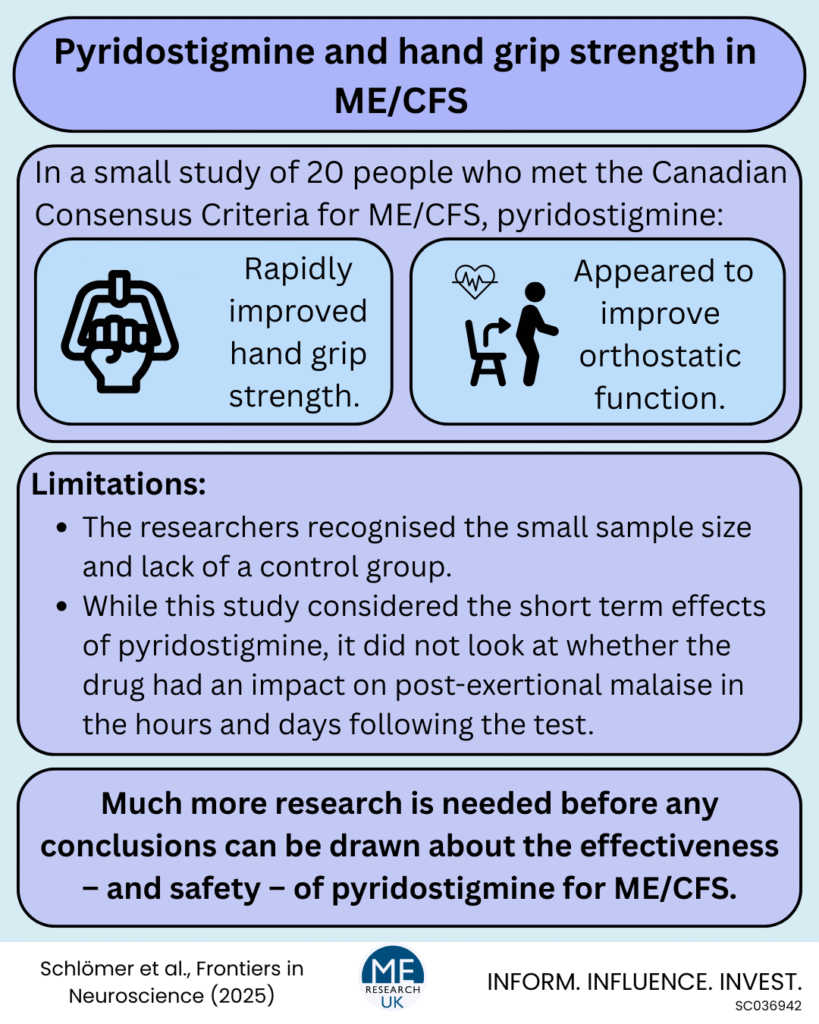Hand grip strength – a measure of the force exerted by hand muscles when gripping an object – has been found to correlate with symptom severity in people with ME/CFS.
Therefore, a small study of 20 participants published in the journal ‘Frontiers of Neuroscience’ aimed to assess whether a drug called pyridostigmine might increase hand grip strength in people with ME/CFS. Interestingly, the research team also considered whether the drug had an impact on orthostatic intolerance.
Pyridostigmine is a drug normally used to treat the symptoms of an autoimmune condition called Myasthenia gravis which causes muscle weakness and excessive muscle fatigue. Pyridostigmine works by enhancing the stimulation of muscles in the body on a short-term basis (the medication works within 30 minutes, and the effect lasts for up to four hours).
The research team – which included Prof. Carmen Scheibenbogen who has previously worked on research funded by ME Research UK – recruited 20 participants who met the Canadian Consensus Criteria for ME/CFS. For two of the participants, a respiratory tract infection (RTI) acted as the ‘triggering event’ for ME/CFS, and all others ‘developed ME/CFS following SARS-CoV-2 infection’.
Participants completed two study visits:
- At the first visit, the researchers collected information on handgrip strength and orthostatic intolerance without the use of pyridostigmine.
- During the second visit, the same tests were conducted, but this time participants were given a single dose of 30mg of pyridostigmine.
Results suggested that in this small group of 20 people who met the CCC for ME/CFS, pyridostigmine rapidly improved handgrip strength. Interestingly, findings also indicated that administration of pyridostigmine significantly reduced ‘orthostatic heart rate change‘ – suggesting an improvement in orthostatic function.
The team suggest that pyridostigmine may work by improving oxygen and nutrient delivery to muscles, something that could ‘result in better muscle performance and reduced fatigue during exertion’. However, it is also noted that mitochondrial dysfunction in ME/CFS may limit the effectiveness of pyridostigmine as the energy supply to muscles would still be insufficient.
In the discussion section of the paper, the researchers recognise the limitations of their study including the small sample size, and the lack of a control group. ME Research UK also notes that while this research considered the effect of pyridostigmine on handgrip strength and orthostatic intolerance in the short term, it did not look at whether the drug had an impact on post-exertional malaise (PEM) in the hours and days following the test. More research is needed to understand whether and how pyridostigmine impacts PEM in people with ME/CFS.
In conclusion, much more research is needed before any conclusions can be drawn about the effectiveness – and safety – of pyridostigmine for ME/CFS. It will also be useful to consider whether the effects of the drug vary by sources of disease heterogeneity (differences between people with ME/CFS) such as sex, ethnicity, disease severity, and ME/CFS trigger. For example, in this study those who developed symptoms of ME/CFS following a COVID infection were included alongside those who developed ME/CFS after an RTI. Although in this study, the small sample size did not allow the researchers to compare results for the different disease trigger groups, this would be a useful comparison for research teams to make going forward.
Notably, the authors highlight that there is a randomised controlled trial assessing pyridostigmine in people with ME/CFS who have orthostatic intolerance currently underway at Brigham and Women’s hospital at Harvard Medical School. At the 2024 Invest in ME Research Conference, Dr David Systrom, who is leading the Life Improvement Trial (LIFT) alongside Jonas Bergquist (also involved in research funded by ME Research UK), highlighted that to reduce heterogeneity, only those who developed ME/CFS prior to the COVID-19 pandemic will be included in this phase of the study. Importantly, this ongoing study will have a healthy control group.





